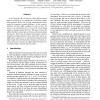Free Online Productivity Tools
i2Speak
i2Symbol
i2OCR
iTex2Img
iWeb2Print
iWeb2Shot
i2Type
iPdf2Split
iPdf2Merge
i2Bopomofo
i2Arabic
i2Style
i2Image
i2PDF
iLatex2Rtf
Sci2ools
NCA
2008
IEEE
2008
IEEE
Finite Memory: A Vulnerability of Intrusion-Tolerant Systems
In environments like the Internet, faults follow unusual patterns, dictated by the combination of malicious attacks with accidental faults such as long communication delays caused by temporary network partitions. In this scenario, attackers can force buffer overflows in order to leave the system in an inconsistent state or to prevent it from doing progress, causing a denial of service. This paper is about the effects that finite memory has on intrusion-tolerant protocols and systems. We present the problem and propose a generic mitigation technique based on repair nodes that reduces the buffer space requirements. An experimental evaluation of the buffer usage with and without this technique is presented, allowing to assess in practice the effects of finite memory in a real, albeit simple, intrusion-tolerant system.
Long Communication Delays | NCA 2008 | Network Computing | Temporary Network Partitions | finite Memory |
| Added | 01 Jun 2010 |
| Updated | 01 Jun 2010 |
| Type | Conference |
| Year | 2008 |
| Where | NCA |
| Authors | Giuliana Santos Veronese, Miguel Correia, Lau Cheuk Lung, Paulo Veríssimo |
Comments (0)

